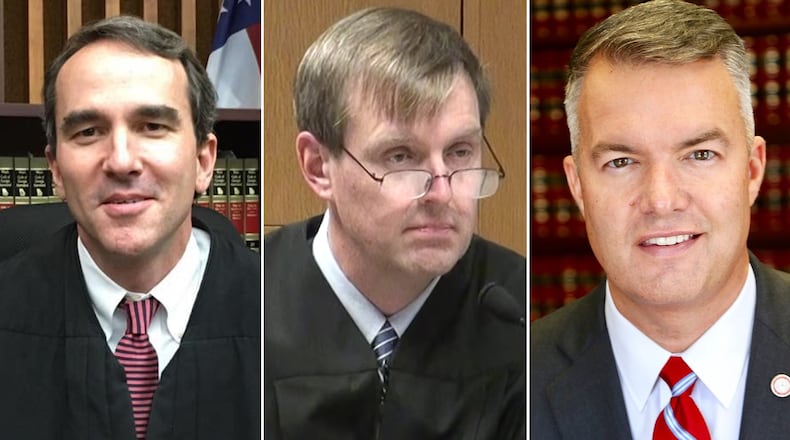The three state appeals court jurists who will decide whether District Attorney Fani Willis should remain on Fulton County’s high-profile election interference case are all appointees of Republican governors and have honed reputations as being conservative yet fair-minded.
Judges Trenton Brown, Benjamin Land and Todd Markle are now in the national spotlight in one of the four criminal cases brought against former President Donald Trump. Initially, Land, Markle and Judge Yvette Miller were randomly chosen to hear the appeal, but Miller, who is retiring at the end of the year, quickly recused herself and was replaced by Brown.
Oral arguments were initially set for Oct. 4. But Christina Cooley Smith, deputy court administrator for the Court of Appeals, said Tuesday that the date will be rescheduled — if oral arguments are requested and the judges choose to grant them — due to a timing conflict. The judges are constitutionally required to issue a ruling by March 2025.
Atlanta attorney Andrew Fleischman noted that the panel lacked a judge tapped by a Democratic governor. Then-Gov. Roy Barnes appointed Miller, who is also the first Black woman to serve on the appeals court. Willis is a Democrat.
“This is a conservative panel,” Fleischman said. “Miller was probably the best draw Fani Willis could have had, but she’s no longer on it.”
Credit: TNS
Credit: TNS
Madison attorney J. Scott Key, who specializes in appeals, said the members of the three-judge panel call cases as they see them.
“You’re gonna have about as neutral and a down-the-line set of judges as you could ask for in these three,” Key said. As for all three being GOP appointees, “I don’t think you’re going to see that factor into how they decide the case.”
Key noted that all three of the judges served as Superior Court jurists before they were appointed to the appeals court bench. Markle was a member of the same panel in Fulton as Scott McAfee, the trial judge for the Trump case. McAfee ruled in March that Willis could stay on the case after holding a hearing about her romantic relationship with Nathan Wade, then the case’s special prosecutor.
“You have judges who know what it’s like to be in Judge McAfee’s position, to preside over a trial court and have difficult issues come before it in a pre-trial phase,” he said. But, Key added, “there’s nothing like this in any Georgia judge’s history.”
Laurie Webb Daniel, an Atlanta appellate attorney, described all three judges assigned to the case as “conscientious.” The fact that the court decided to take up the appeal in the first place, she said, indicates that “everybody’s taking this very seriously.”
“I think that they did not do this for purposes of delay, but because they want to make sure the issues are vetted,” Daniel said.
Here’s more about the judges’ backgrounds:
Judge Trenton Brown
Brown was appointed to the bench in 2018 by then-Gov. Nathan Deal and elected to a four-year term two years later. A graduate of University of Georgia and Mercer Law School, Brown was sworn in last summer as the vice chief judge on the court.
He spent six years as a Superior Court judge in the Ocmulgee Judicial Circuit, which includes eight counties in Middle Georgia. Before that, Brown was a state court judge appointed by Gov. Sonny Perdue and a private practice lawyer in Putnam County, where he still resides. He served on Gov. Deal’s Court Reform Council, which was tasked with reviewing practices within the court system and making recommendations to improve its efficiency.
In an interview with ALM Media in 2019, Brown was asked about his approach to his job. He said “the judiciary should stay in our own lane” with regard to separation of powers. “The fastest way to open a door to intrusion, political or otherwise, is to show a willingness to pursue lawmaking in the form of inappropriate judicial activism,” he told the legal publication.
Judge Benjamin Land
Land graduated summa cum laude from both the University of Georgia and UGA’s law school. Land then worked as a private attorney, representing plaintiffs and defendants. He obtained several record-setting verdicts and defended a number of nationwide class action lawsuits, according to the appeals court’s website.
In 2018, Deal appointed Land to serve as a Superior Court judge for the six-county Chattahoochee Judicial Circuit in West Georgia. He served there until 2022 when Gov. Brian Kemp elevated Land to the appellate court.
In a 2022 interview with law.com, Land warned lawyers not to “exaggerate or embellish” their arguments before the court. “If you’ve misrepresented the law, we’re going to pick up on it,” Land said. “If you lose your credibility, you’ve lost everything.” He said his role as an appellate judge is to ensure “that the playing field is level and the rules are followed equally by everybody.”
Judge Todd Markle
Markle, who grew up in South Cobb, was appointed to the appeals court by Deal in 2018. At the time, Markle was a Fulton County Superior Court judge.
Markle obtained his bachelor’s degree from the University of Georgia, graduating magna cum laude in 1986, and his law degree from Mercer Law School in 1989. He was a private attorney handling general civil litigation until 2011 when Deal, then the newly elected governor, named Markle his executive counsel. That same year, Deal appointed Markle to chair the state’s Criminal Justice Reform Council which pushed through significant changes that transformed the state’s justice system, curbing soaring prison costs, overhauling juvenile justice and dropping prison admissions of Black people to historic lows.
As a Fulton judge, Markle was instrumental in establishing what would become the state’s largest Veterans Treatment Court, which aims to keep veterans from facing felony charges for nonviolent offenses. “Most of the veterans do quite well,” Markle said in a 2014 interview with The Atlanta Journal-Constitution. “This program is a lot cheaper for the taxpayers than sending them to prison.”
Keep Reading
The Latest
Featured






